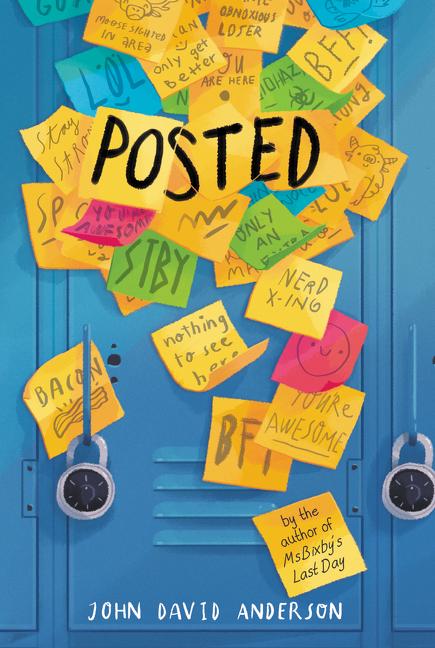Posted
by John David Anderson (Author)

In middle school, words aren't just words. They can be weapons. They can be gifts. The right words can win you friends or make you enemies. They can come back to haunt you. Sometimes they can change things forever.
When cell phones are banned at Branton Middle School, Frost and his friends Deedee, Wolf, and Bench come up with a new way to communicate: leaving sticky notes for each other all around the school. It catches on, and soon all the kids in school are leaving notes--though for every kind and friendly one, there is a cutting and cruel one as well.
In the middle of this, a new girl named Rose arrives at school and sits at Frost's lunch table. Rose is not like anyone else at Branton Middle School, and it's clear that the close circle of friends Frost has made for himself won't easily hold another. As the sticky-note war escalates, and the pressure to choose sides mounts, Frost soon realizes that after this year, nothing will ever be the same.
 Locate at a Library Near You
Locate at a Library Near You WorldCat is the world's largest library catalog, helping you find library materials online.
Find books about:
Kirkus
Publishers Weekly
Addressing bullying and true friendship, Anderson's pitch-perfect story follows four friends and the "Sticky Note War" that upends the status quo at their school. Frost, a budding poet, is part of a tight-knit group of friends that provides a refuge from the chaos of middle school in small-town Michigan. Rounding out Frost's crew are J.J. "Bench" Jones, a quintessential benchwarmer; Advik "Deedee" Patel, a Dungeon & Dragons enthusiast; and Morgan (aka Wolf), a piano prodigy. The boys' friendship is thrown into disarray by new student Rose Holland, who challenges their quiet acceptance of hateful taunts and bullying. Arriving just after a cell phone ban and the rise of the use of sticky notes to communicate both kind and hurtful messages, Rose is ostracized, so the friends reluctantly take her in, driving a wedge between increasingly popular Bench and the others. Anderson (Ms. Bixby's Last Day) captures the tumultuous joys and pains of middle school with honesty, creating characters with whom readers will find common ground and insight. Words have lingering and persistent power, Anderson makes clear, but so does standing up for others and making one's voice heard. Ages 8-12. Agency: Adams Literary. (May)
Copyright 2017 Publishers Weekly, LLC Used with permission.School Library Journal
Gr 5-8--Middle school can be rough, even for a tight-knit pack of 13-year-old friends. When the new girl, Rose, joins their table at lunch, things start to change in uncomfortable ways for Frost, Bench, Deedee, and Wolf. It certainly doesn't help that the sharp words and mean thoughts that used to fly around on cell phones, which have been banned, are now pasted on the school walls via sticky notes, out there for everyone to see. The eighth grade that Anderson portrays contains a good deal of hurtful words and somewhat muted violence spun from his memories of being "short and smart (but not that smart) and scrawny and often alone." Both the wit of the prose and the bullying described are sharp and speak to everyday situations in today's schools. Stylistically the novel is solid, with a repetitive emphasis on the power of words. Anderson creates crucial suspense as narrator Frost looks back on the events of the story. Regrettably, the book overhypes itself to a substantial degree: the "war" is not the advertised monumental conflict of competing sides but rather a significant backdrop for a couple of major incidents in the lives of the main characters. VERDICT A forceful book that focuses on bullying and the development of friendships in middle school amid exploration of the power of words. A good purchase for collections serving middle schoolers.--Erin Reilly-Sanders, University of Wisconsin-Madison
Copyright 2017 School Library Journal, LLC Used with permission.Review quotes
JUV035000 - Juvenile Fiction | School & Education
JUV039230 - Juvenile Fiction | Social Themes | Bullying







